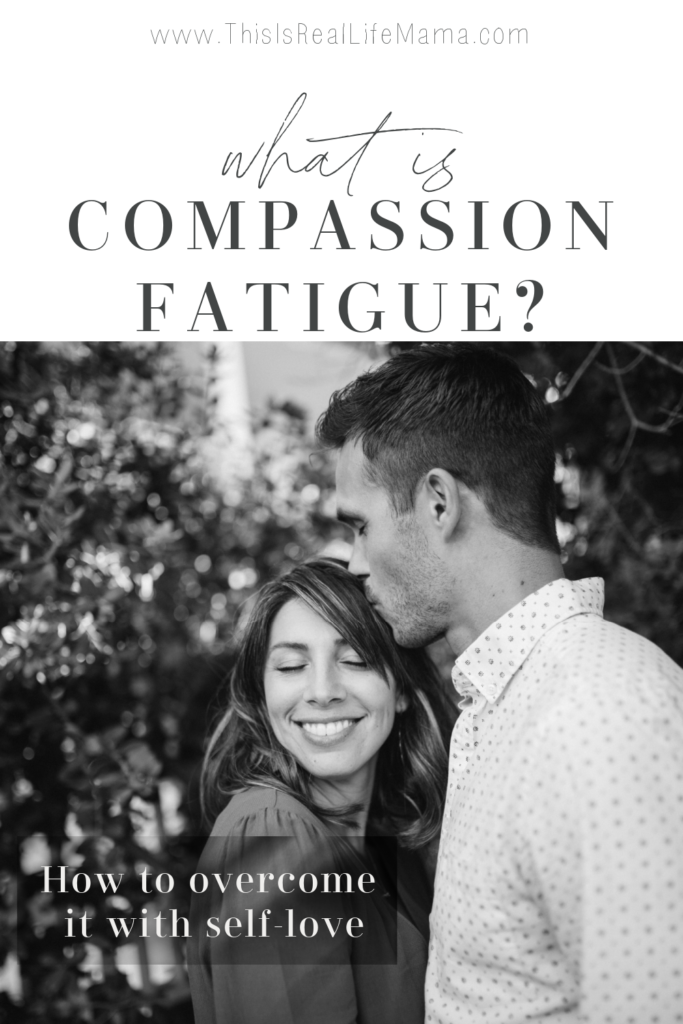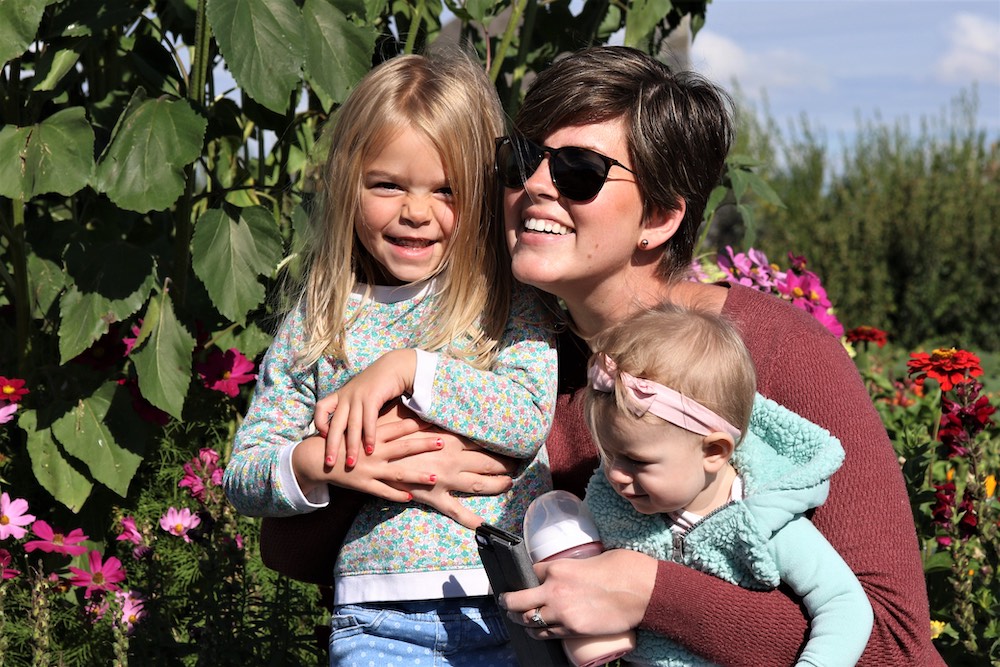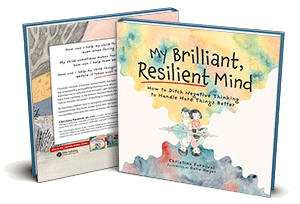The Baggage & Motherhood Guest Writer’s Series gives a space for moms around the world to share their story of what life has thrown their way and how it has impacted them in their role as a Mom. This post by Janine Brown looks at Compassion Fatigue — what it is and how to help yourself recover.
All of the posts in this series touch on the real life struggles of bringing your “stuff” with you to your most important job: Motherhood.
My Journey Through Compassion Fatigue by Janine Brown
I had never even heard of Compassion Fatigue. But when I went to a therapist for what I thought was depression, and she brought up Compassion Fatigue, I knew that was what I was dealing with.
Becoming a new mom while my husband dealt with chronic back pain was not what I had ever envisioned my motherhood to be. I even remember reminding Rob to rest his back and take it easy, while I labored with our first daughter.
Then, when Olivia was 6 months old, things got so bad with Rob’s back that he was taken to the hospital by ambulance. We knew we needed to make changes so I did some research and found a private clinic that would do surgery.
After back and neck surgery that cost us $45K, we thought the hard season was behind us, but it was actually just the beginning. A job lay off, a cancer diagnosis in the family, our dog getting sick, and having our taxes audited made life seem overwhelming.
I just wanted to crawl into bed and forget my problems.
But I couldn’t. I had a little girl that needed me to keep going for all three of us. Some days it was all I could do to keep her fed and clean.
Even though difficulties in life usually make me more sympathetic to others — I felt the opposite.
I was focusing on the negative and anytime someone needed something from me I would feel frustrated and angry. The last thing I needed was more people making requests of me – no matter how small. I wanted nothing to do with other people’s problems or needs, because I felt swallowed up by the needs of my own family.
I kept thinking that it was depression; however, it felt more situational than chemical.
Which in turn made me feel silly. If I started to feel better, anything going wrong, no matter how small, would send me right back into a dark place. It was a serious slump that I felt like I could not dig myself out of, and the stress was overwhelming.

Symptoms of Compassion Fatigue
I learned that through our insurance I had access to a few free sessions with a therapist and decided to go and talk it out. After only one session she brought up Compassion Fatigue – just the title resonated with me! She briefly touched on it and encouraged me to go home and research it to see if I could relate – and boy did I ever!
I learned that Compassion Fatigue often affects people who are in consistent roles requiring high doses of sympathy. Fields where they are caring for others like nursing, paramedics, firefighters, but also people who are caring for an older parent, a disabled child, or a spouse with physical limitations etc.
It happens when you are in a situation where so much compassion is required of you that you get burnt out from it and you start to feel callous. Frankly, you just stop caring about everyone and everything. You are going through the motions.
Symptoms of Compassion Fatigue:
- Burnout
- Chronic physical or emotional exhaustion
- Irritability
- Overwhelm
- Suddenly bursting into tears
CHECK CHECK CHECK CHECK CHECK!
I knew immediately that this was what I was dealing with!
This made SO much sense to me. Rob’s physical decline began when I was becoming a mom, and already having more demands on me than ever before. Then, instead of having a husband to help ease the load (which believe me, he did as much as he possibly could) I ended up having to care for him as well. Then our dog got sick, adding yet another layer of care.
I was tired, but no matter how much I slept, how many little breaks I got, how ahead of chores I was — nothing made it better.
I didn’t have the energy to stay on top of cleaning my house, but then my messy house was also adding to my stress – it was a vicious cycle!
When I watched this Ted Talk, it resonated so much with me. This is a great resource if you think Compassion Fatigue may be something you are facing.
The Remedy For Compassion Fatigue
It got me thinking, how many Moms have this?! Seriously, Moms give so much of themselves in every way, it feels like we would be the poster child for this!
The most interesting discovery in my research of Compassion Fatigue was that it often gets misdiagnosed as depression. However, the way to actually combat it is not through medication, but SELF CARE!
That is the ONLY solution: self-care. To combat exhaustion from taking care of others, we must turn the compassion inward and take care of ourselves. This doesn’t mean we have to be selfish and stop taking care of others — only that we need a balance.
While learning that there is a solution brought relief, it also made me feel like a jerk. Aren’t moms supposed to just give themselves without restraint? Isn’t exhaustion like a badge of honor? The answer is NO, it’s not.
Last week a friend of mine said to me that she’s not one of those moms that needs “me time”. She said it as though it is a badge of honor to not have any needs, and I felt myself shrink a little bit behind the comment – because I DO need “me time”.
My personality needs a break from other people otherwise I implode – that includes my kids. I think it is so dangerous when we recognize that all people are different, but we don’t take the time to acknowledge that Moms and their needs are all different too!
My Self-Care
What was the surprising homework from my therapist? Spend extra time doing self-care each week. That doesn’t just mean pedicures and baths (although I enjoy those things as well).
It means doing things just for me. Things I found effective:
- Journalling
- Audio books
- Puzzles
- Waking up early
- Starting my own business
- Doing home improvement projects
- Writing in a gratitude journal each day
- Quiet time in the afternoon for my toddler and me
- Podcasts
- Time with friends
- Weekend away
- Meditation (I use the FREE Breathe app!)
- Self-Care Sunday
- And yes, even baths
My therapist said that as long as I am doing it with the mindset and intention of self care – it counts!
Before learning about Compassion Fatigue, I went away for a girls weekend. I didn’t think it could come at a better time, and was convinced it would solve all of my problems.
While it was an awesome relief, I felt the pressure return as soon as I got home. This is not to say that a weekend away isn’t a good thing – just that it can’t be the ONLY thing.
To find relief from constant Compassion Fatigue, you need to show yourself constant compassion.
The next year I went for this girls weekend, I got a room to myself which helped me unwind even more. I also made the decision to leave a bit early and spend some time writing at Starbucks, then I drove to the hotel by myself (it was an hour away). Instead of carpooling, I got more time alone. It made all the difference!
So go for that girls weekend, but don’t let it end there, take the time to change your mindset.
Your mindset is what moves an action from hobby or basic hygiene to self-care. A shower is for hygiene, but can also be for self-care depending on your intention while you take the shower.
Instead of feeling like you don’t have extra hours in the day to add self-care, be intentional during the tasks you already take part in.
If you need to grab a quick shower before you go out and are rushing through it, that is basic hygiene. But if you light candles, ask your husband to watch the kids and listen to some music with the intention that this is time for you. Then it can be self-care.
Whatever your regular routine for self-care, you must increase it to receive the benefit of restoration. If you normally take 2 baths a week, maybe you add reading a book on 2 other nights. Try to at least double your self care routine.
Offers For Help
There is this belief in motherhood that we are supposed to suffer on our own in silence. No one actually says it outright, but it is implied in a million different ways.
Truth is, we need to start celebrating the Moms who ARE asking for help! The Moms who know where their limits are. If we don’t know our limits it is our kids who suffer from a burnt out Mom, not Brenda from down the street that we’re trying to impress.
So when another Mom, or your Mom, or your MIL, or someone from church asks if they can help. Or they even say the sometimes placated, “Let us know if we can help!” TAKE THEM UP ON IT!
When my husband had surgery I was forced to accept help, even when I didn’t want to. I know how awkward and humbling it can feel.
Don’t let your pride get in the way of being a healthy Mom for your family.
If someone asks what you need – give 3 options. These were often mine.
- A meal
- Babysitting
- Walk my dog
We all know that not all offers to help are genuine. Sometimes it is just to be polite. That’s okay, but you will never know which are which unless you take them up on their offer.
By giving 3 options to ANYONE that asks how they can help, THEY get to choose what they would prefer. Maybe they LOVE animals and miss not having a dog, but they don’t like cooking.
This also allows you to have a bit more control. Obviously don’t offer babysitting as an option if you don’t feel comfortable with the person, but then substitute it for something else they could help you with like mowing your lawn.
If they come through on this for you- awesome! If they were just blowing smoke, that’s okay too.
Ask For Help
I feel like I need to say this as well, a lot of times we can feel frustrated at our husbands for sleeping in and not “allowing” us to. Or how they just leave the house on a whim to go somewhere and we don’t feel that we have the same luxury.
We need to speak up! Honestly, there is not a single time that I have ever said to my husband that I need a break, and he has not made it a priority. But I can’t expect him to manage my self-care! I need to tell him what I need, when I need it.
A few Mother’s Days ago, I was looking for some relief, but never communicated WHAT I needed. I was disappointed my husband did not read my mind and know exactly what I needed.
Last year, I told my husband I wanted to go to a pedicure with a friend and then spend the rest of the day with him and my daughter. I told him I didn’t want to make or plan any meals.
Not only did my husband have pastries for breakfast, he got flowers, let me sleep in, and he BABYSAT MY COUSINS KIDS SO WE COULD BOTH GO FOR PEDICURES (his idea)!!!
We need to be vocal about what we need and when we need it. I am now more in tune with when I am approaching burnout and let my husband know so that I can take a break.
I also notice that a lot of women (including myself) struggle with leaving the house guilt free and not rushing back to relieve our partners – even though we need the break!
An older woman in my MOPS group once shared that she realized she was actually robbing her husband of memories with their kids by always rushing in to “rescue him” from the responsibility. What a great perspective!
My husband is completely capable of watching our girls, he doesn’t always need me there, it is a pressure that I had completely put on myself. I also take more opportunities for alone time when I can to avoid burnout. I will go get groceries alone, pick up takeout, even go get the mail. By finding more small chunks of alone time throughout the day, I am also building self-care into my routine and thus proactively avoiding burnout.
Our Homes Influence Our Burnout
Cleaning up after my husband and toddler during this recovery period was a huge stress.
I struggled to find the energy to clean, and when I did, it felt like I was going in circles and not making any progress.
I would tidy our house and pick up everything off the floor while Olivia napped, but before I could get to vacuuming, she was awake and downstairs adding to the mess again.
There is a UCLA study where they discovered that clutter in a home actually raises the cortisol level (stress level) of women. Now, I could have told you that clutter adds to my stress, but it’s always nice to have it backed by science!
In the midst of my Compassion Fatigue I decided to listen to the audio book that everyone was raving about, ‘The Magical Art Of Tidying Up’. I was determined to declutter our home and donated over 100 garbage bags of “stuff”.
I started creating routines that I learned from Allie Casazza. I now clean in the morning for 20 minutes and suddenly my house is no longer a source of frustration – even Rob noticed a difference!
Decluttering and simplifying my motherhood gave me more pockets of time in my day for self-care and eventually I was able to start focusing more on the things that brought me life.
Did It Work?
Yes, it did.
My house started to feel lighter and so did I.
I started to learn how much self-care I needed to restore myself from burnout, but also how much self-care I need to maintain a healthy lifestyle. Then I built routines around what I need so that it becomes a habit and I don’t fall into a rut of burnout again.
For me, an important part of self-care is giving myself some slack whenever things get particularly tough.
Right now, my second daughter Quin, is teething and not happy about it. She isn’t sleeping well and is much more fussy during the day – which is mentally draining for me.
I know this could have put me on edge, but it didn’t have to because I know what to adjust and to ask for help now.
Now when I start to feel burnt out, I have the tools to work on myself.
Moving Forward
If this resonates with you, and you think you have Compassion Fatigue, start doing some more small things for yourself and see how you feel.
As you feel better, increase your self-care. Let your partner know that you’re feeling burnt out and going to focus on yourself for a little while. Prioritize yourself and not the cleanliness of the house for a few days.
Bring in reinforcements.
In these strange times our resources are limited for help. That’s why it is more important than ever for us to be intentional with the little bit of time that we do get to ourselves.
Self-care also is not something that only can be done by yourself. You can include your kids by going for a drive or getting everyone in the stroller and listening to an audio book. Playdates, playground, cuddles while you watch a kids movie with your little ones etc.
Be creative!

Janine is a wife to her eHarmony match Rob, and mother to two little wildflowers. She is decluttering her way to a home she loves by combining styles with her husband and indestructible decor that will endure her girls’ childhood. She lives with her family in Calgary, Canada, and is frequently spotted with a chai tea in her hand. Be sure to follow her here on Instagram.
I want to say a big THANK YOU to Janine for writing such a helpful and detailed post and for sharing her struggles, her method, and her triumphs. May we all learn from you!
SEE THE REST OF THE POSTS IN THE BAGGAGE & MOTHERHOOD SERIES HERE!


